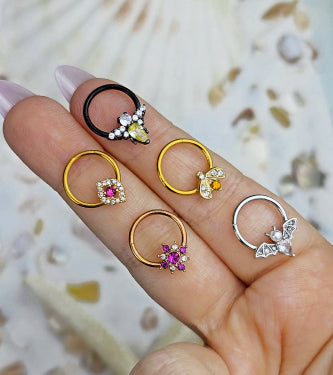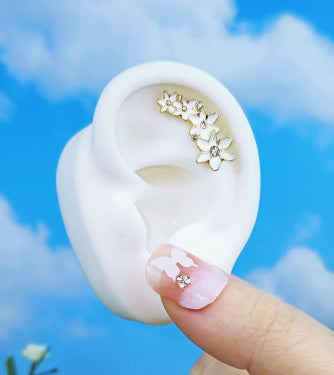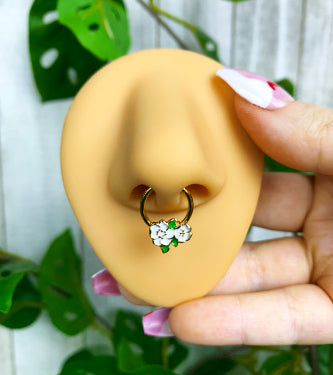Dimples are adorable, and if you’re not lucky enough to be born with natural cheek dimples you can now get them by having your cheeks pierced. My best friend Tiffany has wanted to get her cheeks pierced for years. She currently has multiple facial piercings including snakebites, septum, double nostril, and her Monroe. She is a piercing veteran, and was fully aware and ready to take on the possible challenges of getting her dimples done. This region of your face is home to blood vessels, nerves, and the saliva producing parotid duct. The cheek piercing process was longer than most piercings due to the preparation.
James at American Skin Art in Buffalo, NY is the professional piercer she used for this procedure. James also has his cheeks pierced, which is always reassuring when your piercer can give personal advice on a specific piercing. He explained the importance of locating all of the glands and ducts in the cheeks; if these are punctured there are serious health risks. First he massaged her cheeks with gloved hands to find the anatomy he was looking for. Then the points of entry were carefully measured and marked. He had Tiffany give her best cheesy smile to find the proper location for her new dimples. He warned her that even if she took the piercings out her cheeks, she would always have dimples from this point on (not a bad thing in my book). Once everything was in place she laid down.
All of the piercing instruments are sanitized and sterilized with an autoclave or completely brand new; this is the most important part of a proper piercing parlor. The piercer used forceps to clamp the skin of the cheek around the marking. He then inserted a long 14 gauge hollow piercing needle from the outside in. He corked the end of the needle and advised her not to move her tongue. There was minimal blood and very little pain, only pressure. Then he chased the needle with a 14g surgical grade titanium barbell, and everything was snapped into place. The barbell used for a fresh piercing is extra long to accommodate swelling. With the method shown, the length of the barbell is not standard but individualized, and is dependant on how thick the actual cheek tissue is. A barbell with balls on both ends is used because cheek piercings have a high rate of swelling; a flat disc labret end would get swallowed up by the cheek and cause problems to both the piercings and oral health.
She took it like a champ, no tears or screams from this girl. Tiffany was told that her cheeks would swell up like a chipmunk the next day. The barbells protruded from her face, but she knew it was necessary for proper healing. Thankfully, Tiffany was very lucky and her body reacted astonishingly well to the piercings. There was minimal initial swelling and no chipmunk cheeks the next day as predicted. Proper aftercare instructions from the piercer involved sea salt soaks and swishing with saltwater. In order to properly soak the new piercings, the saltwater must be put in a shot glass and held over the piercing while the head is tilted back. Soaks get kept on the piercing for several minutes around 3-4 times a day. It is crucial to care for these piercings properly; especially in the beginning due to the freshness of the wound. Healing time is up to a year (everyone heals differently and some people unfortunately never completely heal). The process involves getting the original barbells (used at the time of the piercing) downsized. This may take several trips to your piercer, but it’s worth it to have the proper fitting jewelry.





